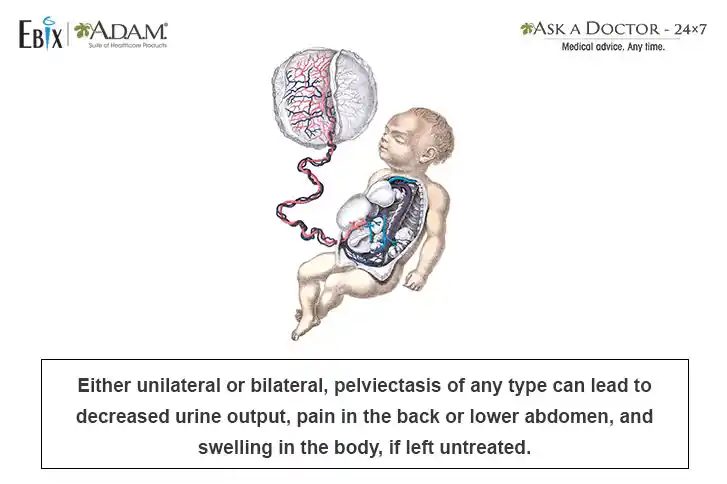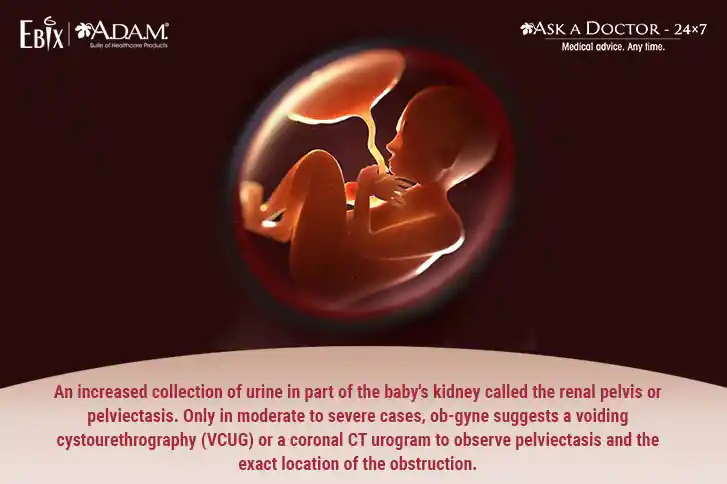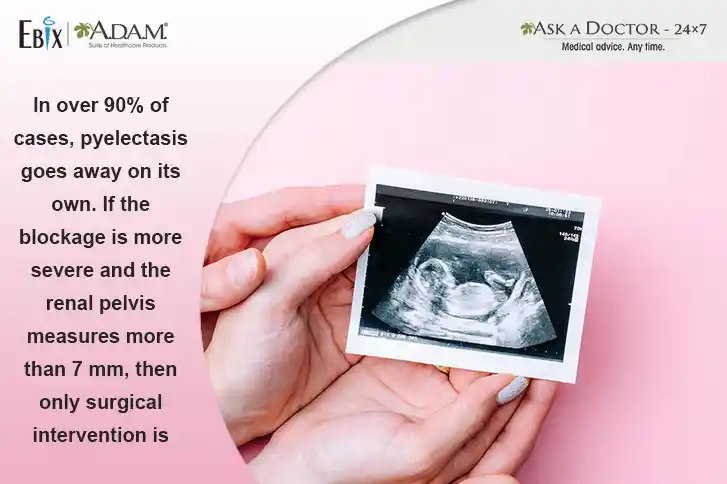Your Unborn Baby May Have A Dilated Pelvis Or Kidneys: Know All About Pelviectasis
Nowadays, an ultrasound scan is increasingly being used to find congenital anomalies in unborn children at 20th-week-anatomy ultrasound scans. At this time, pelviectasis is one of the commonly found anomalies that show up in almost 1% to 2% of pregnancies. When detected during pregnancy or shortly after birth, it is a significant cause of anxiety in new parents about the renal health of their baby. In the scan, an obstruction in the outflow of urine would be found. This obstruction results in the stasis or reflux of urine, resulting in dilating the upper urinary tract, pelvis (pelviectasis), and kidneys (hydronephrosis). Keep reading to know all about pelviectasis in children.
Types of Pelviectasis 
It may be unilateral or bilateral.
- Unilateral pelviectasis means that the pelvis of one kidney is dilated. In unilateral pelviectasis, obstruction to urinary outflow is in the ureter.
- Bilateral Pelviectasis means that the pelvises of both kidneys are enlarged. In bilateral pelviectasis, the obstruction is possibly in the lower urinary tract.
In most cases, it is mild and within physiological limits (the size of the pelvis is within normal range). There are no remarkable symptoms in such cases, and there is nothing much to worry about as it resolves by itself. However, in some cases, it may result in hydronephrosis and the kidneys may get damaged. This may lead to decreased urine output, pain in the back or lower abdomen, and swelling in the body.
Causes of Pelviectasis

Common congenital causes of obstruction are ureteropelvic junction obstruction and vesicoureteral reflux.
- Ureteropelvic junction obstruction is usually at the junction of the pelvis and ureter.
- Vesicoureteral reflux is an abnormal flow of urine from the urinary bladder toward the ureters and kidneys.
In some older children, pelviectasis may be seen as a new finding and it may be caused by conditions like kidney stones getting stuck in the urinary tract, inside a valve in the urethra, tight, foreskin, or an injury to the urethra. Sometimes, pelviectasis may result in recurrent urinary tract infection (UTI) episodes. Yet, having one or two episodes of UTI does not cause damage to the kidneys. Recurrent UTIs may cause problems.
Diagnosis of the Cause of Pelviectasis

Kidney function tests and urinalysis help find any problems with kidney function and the urinary tract. To find the exact location of the obstruction, the doctor may suggest a voiding cystourethrography (VCUG) or a coronal CT urogram. A voiding cystourethrography is done by instilling dye into the urinary tract and taking images to find the obstruction in it. This test is not needed in mild cases. An instilled dye may cause skin allergy or even damage to the kidneys. Therefore, this test is considered invasive and is done only in moderate to severe cases requiring surgical intervention. More frequently, the doctor will suggest that you repeat the renal ultrasound every four weeks to see if pelviectasis is increasing or decreasing with age. The doctor will also observe the amniotic fluid index and lung development during pregnancy. If the renal pelvis measures more than 7 mm in the 32-week ultrasound, then the pediatrician may refer you to a nephrologist or urologist for further management.
How is Pelviectasis Treated?

Most children outgrow pelviectasis by themselves with age and no other treatment is needed. Parents can support their children by giving them cleaner water to drink. A good natural medicine can be prepared by crushing the leaves of radish to extract a few drops of its juice. This is to be ingested with a spoon of honey twice a day for a few days. It can help provide anti-oxidant support. In the case of UTI, a culture and sensitivity test can be done and antibiotics are given accordingly to clear the infection. For some children, surgery is needed to save the kidneys.
Hearing that your baby has a dilated pelvis or kidneys may be scary, but a second opinion may help guide you further in managing your child’s health. Ask a Nephrologist or a Urologist online for any doubts or queries in your specific case.
Ask a Specialist
Recent Questions


